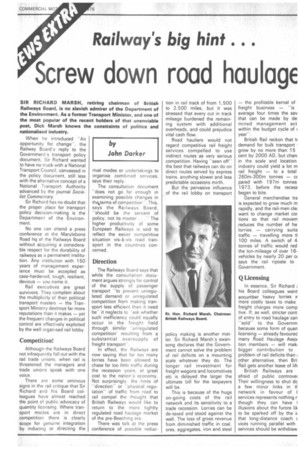Railway's big hint . . .
Page 27

If you've noticed an error in this article please click here to report it so we can fix it.
Screw down road haulag€
by John Darker
SIR RICHARD MARSH, retiring chairman of British Railways Board, is no slavish admirer of the Department of the Environment. As a former Transport Minister, and one of the most popular of the recent holders of that unenviable post, Dick Marsh knows the constraints of politics and nationalised industry.
When he introduced "'An opportunity for change", the Railway Board's reply to the Government's transport policy document, Sir Richard wanted to have no truck with a National Transport Council, canvassed in the policy document, still less with the alternative concept of a National Transport Authority advanced by the journal Socialist Commentary.
Sir Richard has no doubt that the proper place for transport policy decision-making is the Department of the Environment.
No one can attend a press conference at the Marylebone Road hq of the Railways Board without acquiring a considerable respect for the durability of railways as a permanent institution. Any institution with 150 years of management experience must be accepted as case-hardened, tough, resilient, devious — you name it.
Rail executives are great survivors. They complain about the multiplicity of their political transport masters — the Transport Ministry destroys far more reputations than it makes — yet the frequent changes in political control are effectively exploited by the well organised rail lobby.
Competition!
Although the Railways Board not infrequently fall out with the rail trade unions, when rail is threatened the managers and trade unions speak with one voice.
There are some ominous signs in the rail critique that Sir Richard arid his Board colleagues have almost reached the point of public advocacy of quantity licensing. Where transport modes are in direct competition there is clearly scope for genuine integration by inducing or directing the rival modes or undertakings to organise combined services, says their reply.
The consultation document "does not go far enough in examining possible changes in thelterms of competition". This, says the Railways Board, "should be the servant of policy, not its master . . " The higher productivity of some European Railways is said to reflect the easier competitive situation vis-à-vis road transport in the countries concerned.
Direction
The Railways Board says that while the consultation document argues strongly for control of the supply of passenger transport "to prevent unregulated demand or unregulated competition from making transport less efficient than it need be" it neglects to -ask whether such inefficiency could equally occur in the freight field through Similar 'unregulated competition' resulting from a substantial oversupply of freight transport".
In effect, the Railways are now saying that far too many lorries have been allowed to chase far too little traffic during the recession years. at great cost to the nation's economy. Not surprisingly, the hints of "direction'' or "physical regulation" of traffic from road to rail compel the thought that British Railways would like to return to the more tightly regulated road haulage market of the pre-Beeching era.
There was talk at the press conference of possible reduc
tion in rail track of from 1,500 to 2,500 miles, but it was stressed that every cut in track mileage burdened the remaining system with additional overheads, and could prejudice vital cash flow.
Road hauliers would not regard competitive rail freight services compelled to use indirect routes as very serious competition. Having "seen off" the best that railways can do on direct routes served by express trains, anything slower and less predictable occasions mirth.
But the pervasive influence of the rail lobby on transport policy making is another matter. Sir Richard Marsh's swansong declares that the Government cannot solve the problem of rail deficits on a mounting scale whatever they do. The longer rail investment for freight wagons and locomotives etc is delayed the larger the ultimate bill for the taxpayers will be.
This is because of the huge on-going costs of the rail network and its sensitivity to a trade recession. Lorries can be de-taxed and stood against the wall. The loss of gross revenue from diminished traffic in coal, ores, aggregates, iron and steel — the profitable kernal of freight business — "is average four times the say that can be made by de' mined management act within the budget cycle of year".
British Rail reckon that ti demand for bulk transport grow by no more than 15 cent by 2000 AD, but chani in the scale and location industry could yield a lot m rail freight — to a total 260m-300m tonnes — cc pared with 197m tonnes 1973, before the recess began to bite.
General merchandise tra is expected to grow much m rapidly, and the rail-men cle; want to change market cor tions so that rail movem reduces the number of he lorries — carrying suita traffic — travelling more tl 100 miles. A switch of 4 tonnes of traffic would red the ton-mileage of over 16vehicles by nearly 20 per cc says the rail riposte to Government.
Q Licensing
In essence, Sir Richard L his Board colleagues want encumber heavy lorries y more costly taxes to make freight charges more comp tive. If, as well, stricter cont of entry to road haulage can "sold" to the Governm because some form of quan licensing — already favoured many Road Haulage Assol tion members — will mak; bigger contribution to problem of rail deficits than ; other alternative, then BO Rail gets another lease of lift British Railways are afraid of public controvel Their willingness to shut do a few minor links in tt network in favour of 1 services represents nothing r though they can have illusions about the furore lik to be sparked off by the it that long-distance coach vices running parallel with services should be withdraw




















































































